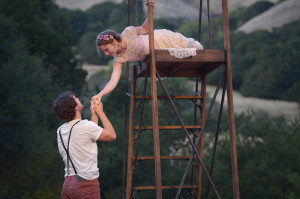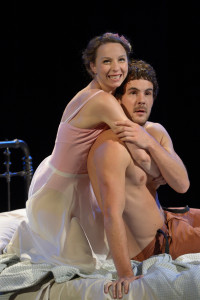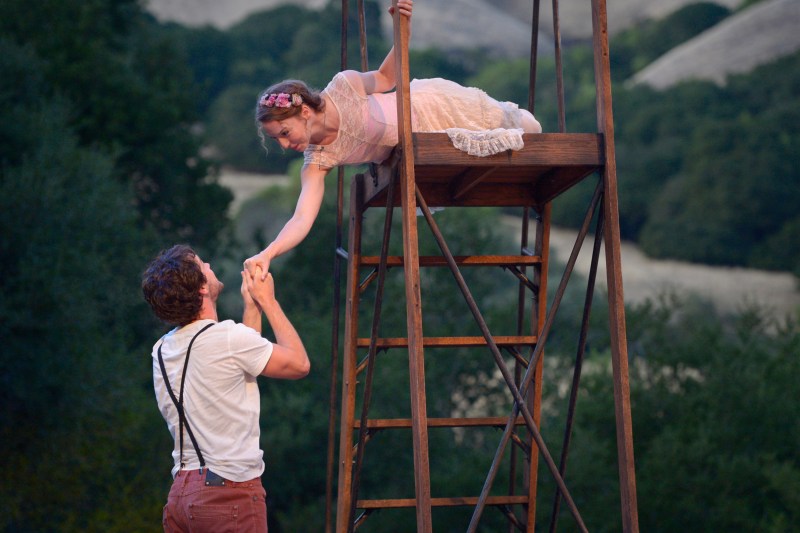
For a cautionary tale about youthful haste, it can be easy to forget that the entirety of the action in “Romeo and Juliet” occurs in just 72 hours. In director Shana Cooper’s brilliant new production of “Romeo and Juliet” at Cal Shakes, the lighting that changes from morning to night is just one way in which time, age and haste are always centre stage.
Cooper’s production is pared down in every way. The text has been shortened — excising many of the Montague clan and enabling a cast of just seven actors – and gives Cooper room to play with the pacing of the dialogue and scenes. This helps to emphasize the characters’ rash decisions and allows for moments of reflection. Juliet’s “Romeo, wherefore art thou Romeo” speech is slowed down significantly, allowing Juliet to reflect and parse out her words thoughtfully. She seems clever enough to be able to think clearly about her fate but too young to be capable of effectively doing so. The witty banter and rhyming couplets of the lovebirds drive the action at the beginning, rather than focusing on the warring families. Were it not for the external forces that shortly act on the characters, the audience might feel like it could have landed in a romantic comedy.
The stage, too, has been cut down to the essentials. A bare thrust stage made from two crossed platforms

provides multiple levels for the action, often separating the main action from monologues delivered to the audience. The few set pieces that do appear are used with purpose, often to remind us of the characters’ haste or to augur misfortunes to come. Romeo and Juliet’s untouched marriage bed is lit upstage when Romeo murders Tybalt in the climax, emphasizing how the young lovers had yet to even consummate their marriage.
Casting Romeo and Juliet is often a challenge — actors who are the right age for the characters – 17 and 14 – may be too inchoate to handle the parts, while using more seasoned actors can detract from the believability of these rash young lovers. Cooper’s solution was to hire experienced Shakespearean actors in their twenties – the phenomenal Rebekah Brockman as Juliet and the impressive Dan Clegg as Romeo – but to have them play convincing teenagers through deliberately jittery movements – they are always moving and never slowly – with fast-paced and even high-pitched voice work. Meanwhile, the production’s adult characters are more sedate, deliberately sitting down to rest, and unable to keep up with the young people.
The performances feel modern – Juliet just flops down on the ground to sit – and so does the effect of the war between the Capulets and Montagues on their children. Romeo and his friends may be rude to the Capulets on principle, but we don’t see any outright hatred. This is his parents’ war and we are ever conscious of the bad parenting decisions that contribute to the final tragedy. As Juliet prepares for the ball at the beginning, there’s a beautifully choreographed dance where she is passed from person to person, her body moved and molded against her will, her fate seemingly out of her control — after all, her parents wish to hastily marry her off to Paris.
Cooper’s production dispenses with cliché and revitalizes the play, distilling it down to the essential and the often unexplored with every directorial choice. Even the couple’s twin-sized marital bed, a child’s bed in the Capulet house, reminds us of this production’s central thesis — these are children playing dress-up because they’ve been taught that behaving like adults is now their task, despite not being cognitively up to it quite yet.
